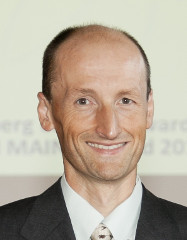Réalisation: Lucas Léger, communication CNRS Alpes, Néel (CNRS)
Research Group Wernsdorfer
 Prof. Dr. Wolfgang Wernsdorfer
Prof. Dr. Wolfgang Wernsdorfer
Contact:
KIT
Physikalisches Institut
Wolfgang-Gaede-Str. 1
D-76131 Karlsruhe, Germany
tel. +49 721 608 43430
sekr. +49 721 608 43451
fax +49 721 608 46103
mail wolfgang.wernsdorfer∂kit.edu
Education
1981 - 1985: Apprenticeship for electrician, Elektro Schäfer, Würzburg
1985 - 1988: Berufsoberschule (Professional school), Würzburg
1988 - 1991: Physics at University of Würzburg, Germany
1991 - 1995: Ecole Normale Supérieure, Lyon, France
1993 - 1996: Doctorate in physics at the: Centre de Recherche sur les Très Basses Températures and Laboratoire de Magnétisme Louis Néel, CNRS, Grenoble, France
2002 Habilitation, Université Joseph Fourier, Grenoble, France
Positions
1996 - 2003: Junior scientist in the Laboratoire de Magnétisme Louis Néel, CNRS, Grenoble
2004 - 2016: Research director in the Institut Néel, CNRS, Grenoble
Since 2016: Humboldt Professor, KIT, Karlsruhe, Germany
Humboldt Professor
Medaille d'argent CNRS
Research program
Our endeavour is driven by one of the most ambitious technological goals of today’s scientists: the realization of an operational quantum computer, or more general, the development of devices working on the principles of quantum mechanics. In this regard, the basic building block is generally composed of a two-level quantum system, namely a quantum bit (or qubit). Such a quantum system must be fully controllable and measurable, which requires a connection to the macroscopic world. In this context, solid-state devices, which establish electrical interconnections to the qubit, are of high interest, mainly due to the variety of methods available for the fabrication of complex and scalable architectures. Moreover, outstanding improvements in the control of the qubit dynamics have been achieved in the last years.
We are building a unique platform for low-temperature research, with a focus on molecular quantum spintronics, but other subjects are also studied. Our scientific approach uses the superior flexibility of chemistry, concerning tuning, controlling and manipulating the properties of the molecules (spin, anisotropy, redox potential, light, electrical field...), which can lead to breakthroughs in the field of quantum electronics. We fabricate high-quality devices by depositing magnetic molecules in UHV condition and by in-situ characterization/manipulation of the molecule/device assembly using AFM/STM techniques. We explore the quantum properties of these molecules via a hybrid coupling to (i) a quantum dot (ligand, carbon nanotube), (ii) a quantum nanomechanical system, (iii) an optically active ion (NV centres in diamond, etc.), (iv) a superconducting device, and (v) a silicon-based CMOS device. Firstly, the hybrid coupling is used as an amplifier to read out efficiently the spin states of the molecule, minimizing back action from the environment on the spin system and thereby preserving the quantum states. Secondly, it allows us to entangle both systems in order to study new effects, which are intrinsic to the hybrid systems, for example, non-classical states of motion. This could lead to a better understanding of quantum mechanics, new phenomena and applications.
The visionary concept of encoding quantum bits within magnetic molecules is underpinned by worldwide research on molecular magnetism and supramolecular chemistry, within the European Institute of Molecular Magnetism. Supramolecular chemistry will provide different, powerful, and cheap tools and procedures to engineer and assemble quite complex molecular devices, allowing proof-of-principle experiments on a “molecular quantum processor”. The main target for the coming years is fundamental science, with a view on applications in quantum electronics.
Awards
1998: Bronze Medal from CNRS (young researcher distinction)
2002: Wohlfarth Prize Lecture for single magnetic nanoparticle studies
2002: Agilent Europhysics Prize (awarded for studies on quantized effects in magnetic molecular clusters, jointly with Bernard Barbara, Jonathan Friedman, Dante Gatteschi and Roberta Sessoli)
2006: International Olivier Kahn Award (studies of quantum effects in molecular nanomagnets)
2008: European Research Council - Advanced Grant on the subject of Molecular spintronics using single-molecule magnets
2012: Prix Special from the French Physical Society (SFP), for his studies on molecular quantum spintronics
2012: Gutenberg Lecture Award, University of Mainz, for his studies on molecular quantum spintronics
2016: Alexander von Humboldt Professur award, Karlsruher Institut für Technologie (KIT)
2016: Silber Medal from CNRS (senior researcher distinction)
2019: Gottfried Wilhelm Leibniz Prize

